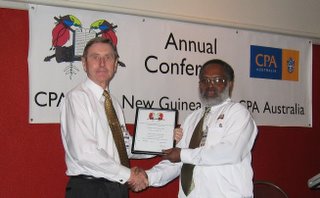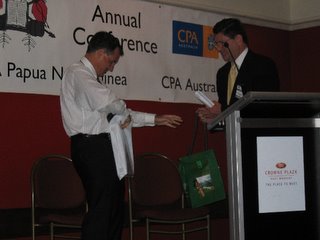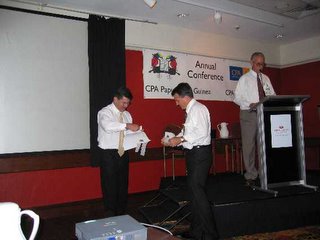This is a business-focussed blog discussing (and debating) current and future issues in information systems management that face government, corporate, and medium-size organisations.
Thursday, December 15, 2005
Showdown: Wikipedia vs Britannica
This is of course in sharp contrast with the recent kerfuffle over Wikipedia's accuracy and peer review process.
Wednesday, December 14, 2005
Australian Accounting Review Supplement
The traditional objective of accounting is to provide information about the pecuniary affairs of an organisation. While this is largely a historical activity that focuses on past performance, the information that accounting provides also forms a useful basis for future action. In this historical context, information technology is commonly viewed as providing a productivity-enhancing and cost-effective means of storing and monitoring transactions, standardising fundamental accounting operations and facilitating compliance and financial reporting obligations. Information technology has reduced the cost of these traditional accounting functions by facilitating the processing and monitoring of large amounts of information about organisational performance. Despite the accretion of these and other benefits to the profession in general, there still exists a degree of uncertainty about the role of accounting professionals in the selection, use and management of information technology in organisations.You can access this online through CPA Australia, or sometimes authors will provide copies upon request.The papers in this special Australian Accounting Review supplement address important aspects of information technology that are of relevance to accounting practitioners and researchers. The supplement has been commissioned by CPA Australia's Centre of Excellence for Information Technology and Management.*
The call for papers for this special edition attracted a large number of high-quality submissions, making the final selection process difficult. All research papers were peer-reviewed and carefully scrutinised by the Centre of Excellence to ensure that those selected for publication reflect the diversity of information technology issues relevant to the profession. The papers that follow deal with a broad range of topics, from discussion and research on IT governance, the impact of IT on business models, electronic business evaluation and adoption, information systems audit and control, IT investment decision-making and strategic planning in government agencies.
Feature articles from the November 2005 edition of Australian Accounting Review (Supplement #37 only) include:
Editorial: information technology - impacts and implications for accountingFeel free to email me if you you need details - these articles can usually be purchased through CPA Australia if you are not a subscriber.
Editorial for edition 37 of the Australian Accounting Review information technology supplement.
IT governance - are boards and business executives interested onlookers or committed participants?
This paper looks at what has to be governed and what IT governance needs to encompass to be effective, examines some of the issues of current IT governance practices from boardroom and business perspectives.
IT investment practices in large Australian firms
This review explores the procedures used by large Australian firms during the four major decisionmaking stages of the IT investment cycle: planning, evaluation, implementation and postimplementation review.
The social dimension of business and IS/IT alignment: case studies of six public-sector organisations
This paper presents the results of a study of the social dimension of the alignment of business strategy with information systems and information technology.
The pervasiveness of information and communication technology: its effects on business models and implications for the accounting profession
This paper discusses the main challenge that confronts firms because of the continued development in information and communication technologies (ICT) is the reduction in information asymmetry as product markets become increasingly information driven.
Consideration of options from an entrepreneuria, technical and operational perspective - an e-business design framework approach
This paper draws upon the emergent knowledge of e-business, together with traditional strategy theory, and provide a simple framework for the evaluation of business models for e-business.
The effect of e-commerce adoption on small/medium enterprise industry structure, competitive advantage and long-term profitability
This paper seeks to evaluate the relationship between e-commerce adoption and long-term profitability in small/medium enterprises (SMEs).
Information systems audit and control issues for enterprise management systems: qualitative evidence
This paper presents the results of a study on how the introduction of such software creates a new set of information systems audit and control problems.
Supplement on information technology
This issue of Australian Accounting Review is accompanied by a special supplement dedicated to new research work on Information Technology and Management.
Enterprise resource planning systems - implications for managers and management
This paper analyses the implications of enterprise resource planning systems for organisations in general and for managers and professionals in particular.
Monday, December 12, 2005
CPA PNG Photos

This photo shows Jim Dickson with Peter Pokawin - Jim is being awarded his fellowship of CPA PNG. Jim is CPA Australia's International Director, and this was his fifth (?) trip to the conference - although it has been a while due to a small bout of Ross River fever.
Peter is the President of CPA PNG, and all of us on that trip should thank Peter and CPA PNG for their never-ending hospitality and ability to make us - the interlopers from Australia - feel welcome.
James Kruse, a partner from Deloitte PNG, is presenting Colin Clarke (Executive Dean of the Faculty of Business and Law at Victoria University) with his gifts as a presenter to the conference in the photo below, although knowing James one is uncertain as to exactly what he's going to find in that bag...

And Colin, James, and Bob Wheeler (Executive Officer of CPA PNG) in post-speech euphoria:
 More photos will be posted as events warrant.
More photos will be posted as events warrant.
SQL, SQL, SQL, SQL all the way...
Microsoft clearly likes it - no surprises there. OS News noted the event in passing but did point out that Visual Studio 2005 is a strong companion product. SQLServerCentral.com has an article recording its correspondent's first impressions of SQL Server 2005. SearchWin2000 advises people to upgrade - eventually.
InfoWorld notes that there are marked improvements in programmability and manageability, whilst ZDNet notes that Microsoft is likely to speed up its server upgrade cycle somewhat.
That's a small wrap-up, anyway, so it is interesting to see where this newest release of SQL Server will take us. I haven't received my copy yet, so I cannot make any real comments yet. As usual, though, I am sure it will be a product that is easy to use and has some new features, probably somewhat incompatible with the previous versions. We will see what the Microsoft shepherd has brought to this area of activity.
Thursday, December 08, 2005
Wham, Bam, Thank you Business Process Monitor
To find out more, read the article.